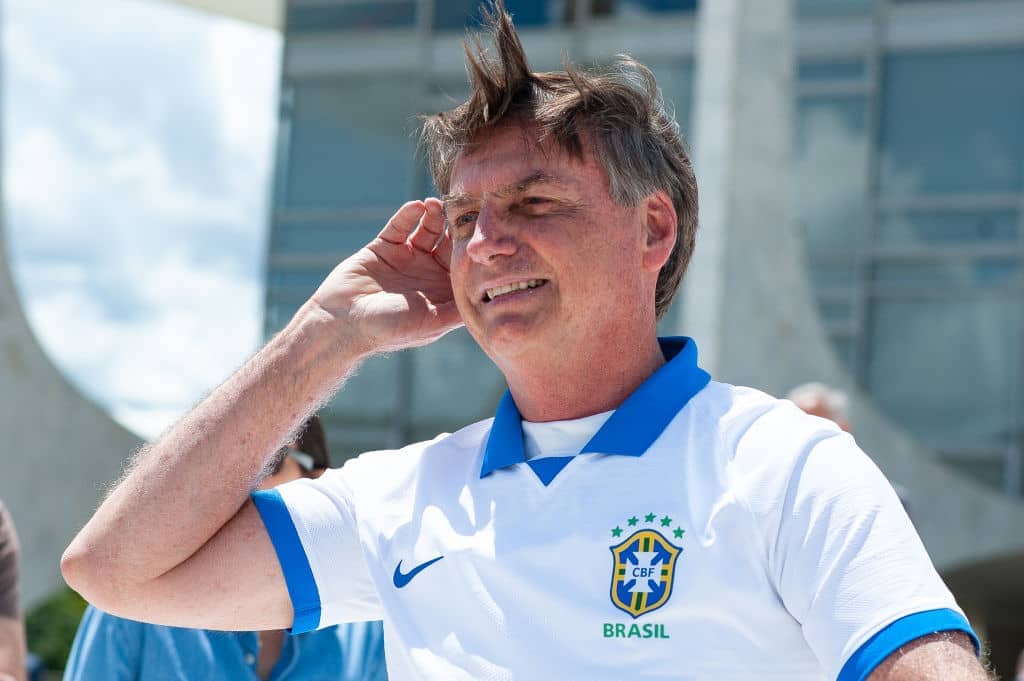Brazil’s football strip is one of the most recognisable garments in sport, perhaps the most potent symbol of Brazil’s sizeable soft power. People who can’t name the country’s capital or president are familiar with the players who made the yellow jersey famous. Names such as Pelé, Sócrates, Ronaldo and Marta are known and loved the world over.
In Brazil, however, the iconic shirt is at the centre of a political tug-of-war. With barely a month until the presidential election, and two months until the World Cup, the fight over who ‘owns’ the jersey, a symbol appropriated in recent years by supporters of Brazil’s president Jair Bolsonaro, is one of the more colourful political dramas currently playing out in the South American nation.
Bolsonaro, a former army captain whose detractors compare him to Donald Trump, is a keen football fan. He is also an unapologetic machista, whose disdain of gays, women and communists is well documented. Hundreds of thousands of people turned out on Brazil’s independence day last week to watch him salute a military parade and then lead the crowd in crude chants about his sexual prowess. Many of them showed their support by wearing replica football shirts.
None of this means that Brazilians won’t celebrate if they win a sixth title in Qatar
Brazil first wore yellow in the 1950s but the shirt’s mystique dates from 1970 and the first World Cup broadcast live and in colour. Previous tournaments had been filmed but the grainy newsreel footage was in black and white and viewers, depending on the weather, light, and technical expertise of the cameramen involved, saw Brazil in varying degrees of grey. In Mexico in 1970, fans finally saw the winners in glorious technicolour. From that moment on, the yellow shirt – called the canarinho, or little canary, in Brazil – was synonymous with swashbuckling and victorious football.
Brazil is the only country to win the World Cup five times and football remains key to its self-esteem. No matter how bad things get politically or economically, Brazilians can always take solace at having produced many of the game’s greatest players and teams.
But as the World Cup edges closer, and Bolsonaro’s politics gets more worrying – he has hinted he will not give up power if he is defeated in October’s ballot – there is unease at how his supporters have adopted the jersey as their own. One recent poll by Ibmec university showed that one-in-five Brazilians would not wear the Brazil shirt for political reasons. Sponsors who turned a blind eye are now openly trying to depoliticise its significance. A beer commercial on TV screens this month is centred around the need to reclaim the shirt for all Brazilians. ‘Independent of our differences off the field, it’s time to remember what the original shirt means,’ intoned veteran commentator Galvão Bueno. ‘It belongs to you, to me, to the whole support.’
The propaganda battle is one reason Brazilians don’t love the national team like they used to, but there are other reasons, too. If past teams were Picassos, vivid, original and stylish, the current side is an NFT (non-fungible token): distant, unlovable and all about making money. Almost all the squad play their club football in Europe, and so many of them leave while still in their teens that fans find it hard to relate. Some of them earn more money in a week than most Brazilians earn in a lifetime, deepening the disconnect. The political persuasions of players past and present, Ronaldinho, Rivaldo and Dani Alves among them, have turned many off, as have the corrupt dealings of football bosses. That is a global scourge but in that too, Brazil is a leader.
‘The Brazilian team has distanced itself from the Brazilian fan,’ star striker Neymar admitted earlier this year. ‘When I was a kid, Brazilian matches were an event, the whole family was there, wearing shirts, eating barbecue, hanging the Brazilian flag from the window. It doesn’t have that same importance today.’
None of this means that Brazilians won’t celebrate if they win a sixth title in Qatar; they have, after all, been here before. Back in 1970 on the eve of the Mexico World Cup, the Brazilian military were arresting, torturing and killing anyone they considered a threat. With no safe ways to express their opposition, dissidents quietly vowed to support Brazil’s rivals, starting with their opponents in the opening game, communist Czechoslovakia.
The Czechs took an early lead and the radicals stifled their smiles. But when Rivellino equalised with a thunderous free kick, even the most hardcore leftists couldn’t help themselves; bars and living rooms erupted with joy. Brazil went on to win all their games. When they returned home with the trophy three weeks later, hundreds of thousands of people took to the streets to greet them. Pride had trumped politics. The yellow shirt, they realised, was theirs too.






Comments